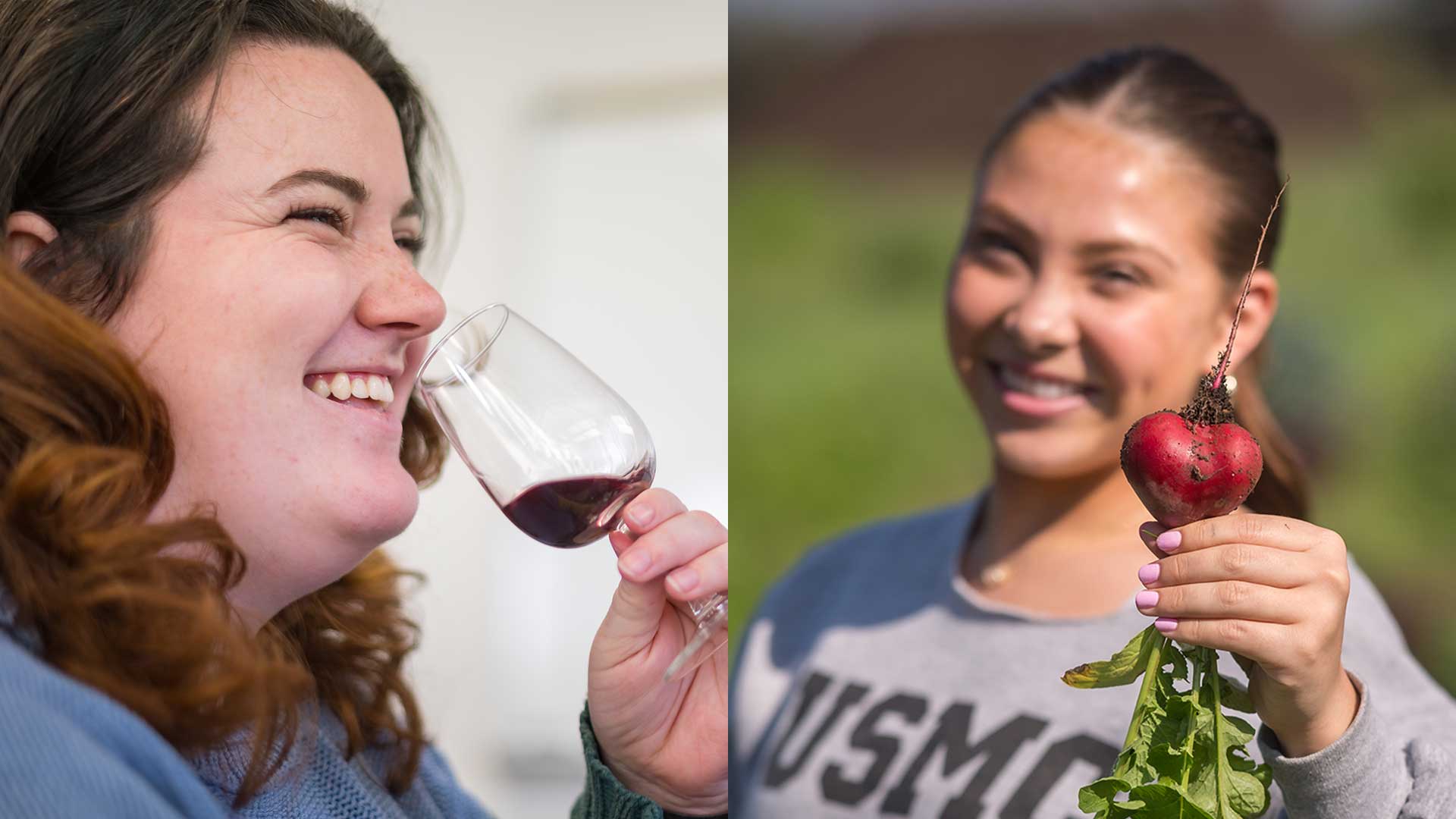Crash Course: General Ed Ag Classes Bear Fruit for Life

Maggie Mulholland (left) smiles while smelling and sampling some wine and Gabby Friday (right) shows off a freshly harvested heart-shaped radish.
Fear of the unknown often stops us from trying new things. Open mic night, ski jumping, hopping on a big old John Deere tractor and taking it for a spin—you know how it goes.
With two introductory classes—one to plant science and another to wine—students gain an agricultural awareness they can use for the rest of their lives.
Sicily Joseph and two of her best friends signed up for the ever-popular “Introduction to Wines” because they could take it together despite having different majors. They had turned 21—a course requirement—and anticipated a wine tasting trip that summer.
“I gained a sort of agricultural literacy that I use more than I ever imagined I would,” said Joseph, a psychology major set to graduate this spring.
With positive energy and endless enthusiasm, Professor Richard Rosecrance empowers students to choose wines that will make their meals more pleasant. He has been helping students take the intimidation out of wine tasting for more than 20 years.
“I’m usually very introverted in class, but I got pulled into pretty much every discussion because he made me and my classmates so comfortable,” said accounting major Macy Caldwell. “He was serious about the subject matter but lighthearted with us.”
In one sensory exercise, Rosecrance helps students identify off odors due to cork taint or other flaws, imploring them to shout out what they see, smell, and taste. “Hot trash,” hollered one student. “Wet dog” offered Caldwell to the fray.
“That’s not something I ever thought I would say in a college classroom,” she laughed.
Rosecrance hurriedly writes the students’ suggestions on the board while asking for more input. It’s fast, inclusive, and fun.
“I love the class because the students are really excited and we’re always doing something different,” said Rosecrance. “I try to demystify the snobbery behind wine by making a little fun of the flowery descriptions. And then the students go home and impress their friends and family with their assessment of wine at the dinner table.”
“The fact that I can speak the language of wine is a skill I will use forever. Everyone should take this class. Get a few friends together and sign up!”
Sicily Joseph (Senior, Psychology)
Rosecrance’s efforts are paying off.
“For a Christmas gift for my mom, we got a winery tour and tasting in Temecula,” said Joseph. “It was really fun to teach her new things even though she has years on me.”
The Caldwells visited a vineyard midway through the semester, and even though her family accused her of being a wine steward’s pet, Macy felt proud of her newfound expertise.
“The steward was surprised at my knowledge and started telling me about how the vineyard treats different grapes. It made the whole experience so much more engaging,” Caldwell said.
Following the 50-minute class, students rinse their glasses and head into the sunshine, smiling.
“The fact that I can speak the language of wine is a skill I will use forever,” Joseph said. “Everyone should take this class. Get a few friends together and sign up!”
Introduction to Plant Science
Forget flashcards, the “Introduction to Plant Science” class packing list is simple: bring curiosity and you’ll soon learn how to grow cucumbers, cabbage, and maybe even Carolina Reapers.
Daniel Crispino (Music, ’23) remembers planting a little kale that grew so prolifically he didn’t know what to do with it all. He shared his bounty with a professor who made kale chips and gave him some in return.
Crispino can’t wait to have his own vegetable garden when he finishes the credential program this May. Right now, however, he’s focusing on succulents and flowers: Hydrangeas, Dianthus, Celosias, and Zinnias.
“I actually went out and spent too much money on flowers during spring break. I’ve really grown to love growing them,” he said.
Students spend their lab hours at Chico State’s University Farm tilling the soil, planting seeds, identifying bugs, and clearing weeds—nurturing their garden. Eventually, they reap the rewards, harvesting fresh vegetables pulled from the rich soil. The midterm assignment is preparing a meal with the vegetables they harvest and sharing it with family or friends.
Professor Hossein Zakeri tailors the class toward non-ag majors so they can experience the simple joys of growing fruit, vegetables, and flowers.
“At first, I was talking about botany, morphology, and anatomy—and quickly found that was the wrong way to go. The more I understood my students and their plans, the more I changed the class to reflect their desires for the future. I haven’t seen plant science taught like this anywhere else in the country.”
The 800-acre classroom certainly helps.
“We took a tour of the farm on my first day and I was blown away,” remembers Crispino. “We were behind a tractor sitting on benches and we were seeing the almonds and peaches and sunflowers. It was beautiful. Some of the folks riding with me behind that tractor became my good friends. So in that class, I not only gained a lifelong skill that I’m going to use forever, but also lifelong friends.”
“I not only gained a lifelong skill that I’m going to use forever, but also lifelong friends.”
Daniel Crispino (Music Education, ’23)


